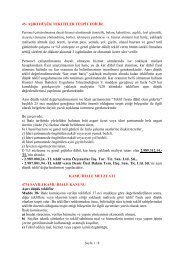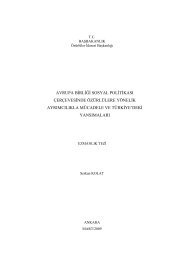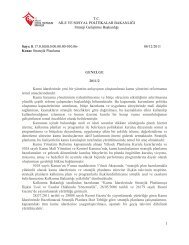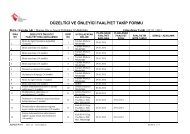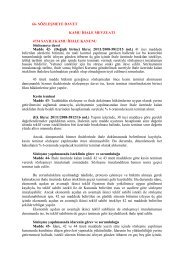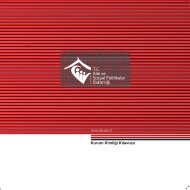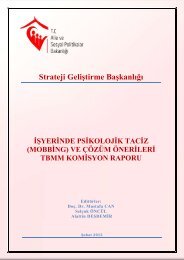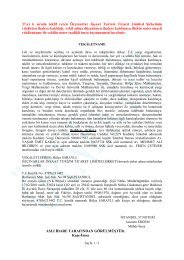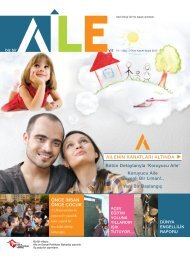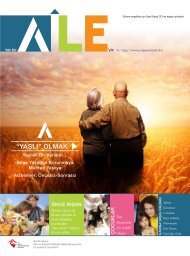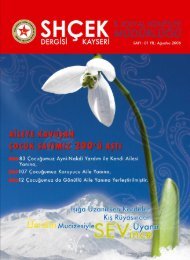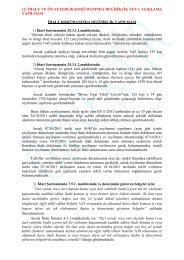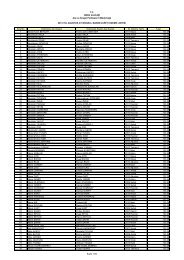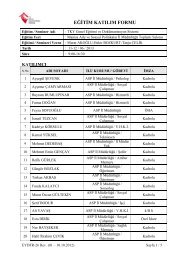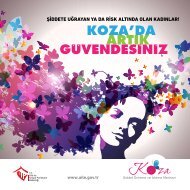Sosyal PolÄ°tÄ°ka tÄ°ka - EÄitim ve Yayın Dairesi BaÅkanlıÄı - Aile ve ...
Sosyal PolÄ°tÄ°ka tÄ°ka - EÄitim ve Yayın Dairesi BaÅkanlıÄı - Aile ve ...
Sosyal PolÄ°tÄ°ka tÄ°ka - EÄitim ve Yayın Dairesi BaÅkanlıÄı - Aile ve ...
- No tags were found...
Create successful ePaper yourself
Turn your PDF publications into a flip-book with our unique Google optimized e-Paper software.
Yıl: 12 Cilt: 7 Sayı: 29 Temmuz - Aralık 2012<br />
In addition to the right-based and regular in-cash benefit programmes, some of<br />
which used to be managed by various go<strong>ve</strong>rnmental institutions before the creation<br />
of the Ministry of Family and Social Policy, GDSA also carries out mainly three types<br />
of traditional po<strong>ve</strong>rty reduction programmes. These are:<br />
Project Support Programme that include supporting income generating local projects,<br />
employability trainings for disadvantageous individuals or groups and community<br />
de<strong>ve</strong>lopment projects<br />
Social assistance programmes for individuals who are not co<strong>ve</strong>red by the social security<br />
system. These programmes include the CCT programme, family support programme,<br />
health and education supports and in kind and cash supports for handicapped<br />
people.<br />
Financial and technical supports for other po<strong>ve</strong>rty reduction programmes that are<br />
jointly carried out with the participation of different public bodies through protocols.<br />
As of December 2010, it has been reported that GDSA used 1,5 billion United States<br />
(US) dollars in total to finance these po<strong>ve</strong>rty reduction programmes in 2010 (GDSAS,<br />
2011a, p.159). Despite the fact that comprehensi<strong>ve</strong> reports and impact assessment<br />
studies were prepared for each type of programme and project support, there is not<br />
a significant number of reference on the impacts of GDSA activities on gendered po<strong>ve</strong>rty,<br />
excluding CCT programme. Howe<strong>ve</strong>r, se<strong>ve</strong>ral academic studies provided precious<br />
clues, highlighting that social assistance system or “welfare regime” in Turkey<br />
is a type of “… gendered institutions which both reflect and influence the attitudes<br />
that determine female employment …” (Bugra and Yakut, 2010, p.519). It is also noted<br />
that the social assistance system basically exclude men and women who are not<br />
expected to participate in the labour market are the main recipients of benefits under<br />
social assistance system (Bugra and Keyder, 2006 and 2008). The rationality behind<br />
this situation seems to be related to a pre-acceptance that women use the benefits for<br />
the needs of their family while men are tend to trifle away (Bugra and Yakut, 2010,<br />
p.532).<br />
3.1. Conditional Cash Transfer Programmes<br />
This section of the article aims to present detailed information about CCT programmes<br />
and initiation of a CCT programme in Turkey. The findings of impact assessment<br />
studies on the CCT programme in Turkey will specially be discussed from gendered<br />
po<strong>ve</strong>rty perspecti<strong>ve</strong>.<br />
It is widely argued that CCT programmes are innovati<strong>ve</strong> tools for the social assistance<br />
programmes that aim to mitigate po<strong>ve</strong>rty and foster social inclusion. CCT programmes<br />
aim to link a cash transfer to a behaviour change which is generally a minimum<br />
54



